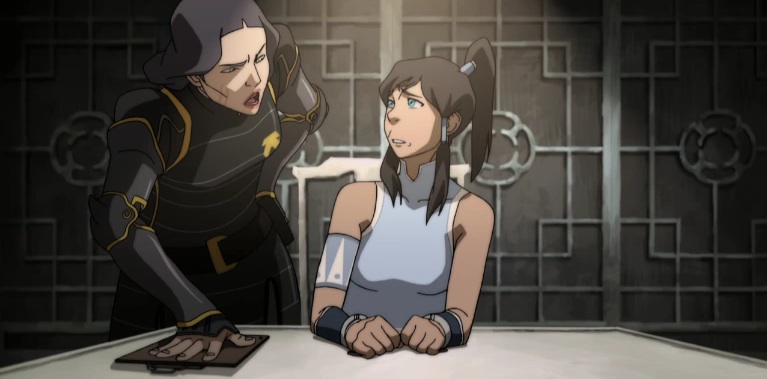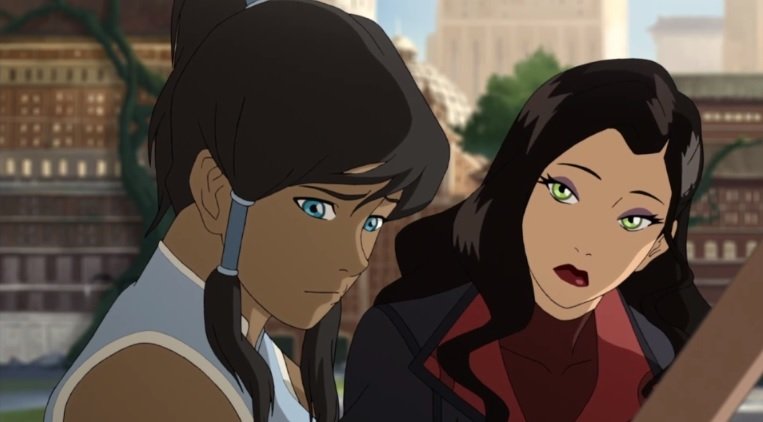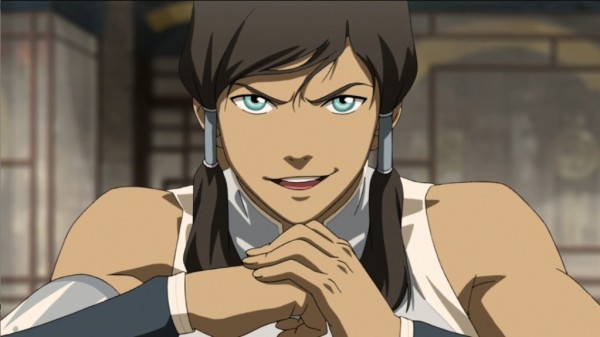It is possible that The Legend of Korra saved my sanity in March.
At the end of February, I finished writing a postgraduate thesis. As many former PhD candidates can attest, that’s the end of a process that can leave you worn out and broken, mentally—and sometimes physically, too. In my case, there were three weeks immediately afterwards where I couldn’t concentrate enough to read anything longer than a blog post. (And then a period of time where all I wanted to read were terrible queer romances.) But I needed something to keep my mind occupied.
Some spoilers ahead for the series.
That something turned out to be Legend of Korra, a show of which I’d heard very little until the internet exploded with joy for the fourth (and final) season’s closing scene. I never made it all the way through Avatar: The Last Airbender — I bailed sometime around the middle of the second season, due to an increasing level of annoyance with all the characters. But Korra was first on the list of things people recommended when I asked for suggestions on what to watch—and wow. I can see why.
Let’s start with the first thing that caught my attention—and kept it, over four seasons—Korra herself. A teenaged female protagonist with muscle definition who is allowed to be arrogant, and rash, and boastful about her physical prowess; whose first, instinctive response to a problem is to try to hit the problem until it goes away. But one who isn’t cruel or thoughtless: quite the opposite.
Hitting the problem usually makes things worse. Learning when not to go with her first instinct, learning how to make realistic assessments of her strengths and her circumstances, and how and when to rely on her friends, seem to be among the major themes of the show’s four seasons.
The dialogue is excellent. The characters are great—even Bolin, who doesn’t, in the end, get the best arc of development. Of all the characters we see across the four seasons, he’s the most emotionally expressive. He gets weepy. He’s kind of shallow, and a little bit dim. But his heart’s in the right place.

Legend of Korra does some rather refreshing things with the portrayal of its female characters, too. There’s Korra, for one. Kuvira, the villain of season four, who is cast almost as Korra’s mirror image—good intentions, but turned to tyranny and oppression rather than protection and support. Then there’s Asami Sato, part of “Team Avatar,” who’s explicitly characterised as an extremely intelligent businesswoman and engineer.
Older women, too, are important as mentors and characters within Legend of Korra’s world. Katara, famous elderly waterbender and hero of a previous generation is one example; Lin Beifong, the cranky and difficult-to-approach Chief of Police of Republic City is another. We see others, especially in the third and fourth seasons, and one of the most startling things about this show is that fact that women in Legend of Korra are not required to be likeable.
Indeed, they often seem to have less need or desire to be liked than the male characters do. Lin Beifong and her estranged mother Toph exemplify this, but so too does Eska, Korra’s Water Tribe princess cousin. Korra herself has to deal with the fickleness of public opinion—the Avatar isn’t well-liked when she can’t fix everyone’s problems. But above all they are allowed to be abrasive and confident of their skills, to hold grudges and to not want to talk about their feelings. To hold and to use power on the same terms as everyone else.
They are also allowed to screw up on the same terms as everyone else. The narrative doesn’t punish them more for it. It doesn’t punish them less, either. But I didn’t realise, until well after I’d finished watching the series, that this was one of the largest reasons I came to love it as much as I ended up doing: it remains rare, almost exceptionally so, for narratives not to treat the consequences of their characters’ mistakes in explicitly gendered ways. Women’s mistakes and faults are very often treated differently than those of their male counterparts. Legend of Korra doesn’t do this. Which is rare enough that it comes as shocking relief.

Also, it doesn’t hurt that Korra and Asami not only like the same boy and have a relationship with him at different times, but remain friends, not rivals. And perhaps become even better friends for bonding over how awkward he is around them after the… complicated… break-ups.
Nor does it hurt that the final scene of the fourth season cements Korra and Asami’s relationship as canonically romantic. It’s nice to have some queer ladies represented.
Taken as a whole, The Legend of Korra isn’t perfect. (The second season in particular is uneven and weak.) But it is a deeply lovely thing, and I wholeheartedly recommend it to anyone else who needs to add more fun to their lives.
Liz Bourke is a cranky person who reads books and occasionally watches things. Her blog. Her Twitter.











The Legend of Korra might not be perfect, but it’s still better than 99% of the rest of television. Same goes for ATLA.
I loved the way the love triangle played out. Love triangles are so endemic in kids media, so for once, for a show to do one, and show that the two people who both liked the same person didn’t have to be enemies was SO refreshing to me. The fact that the narrative blamed Mako. And then it did that great chibi face episode where Gramma threw shade at him for it.
And then there are many episodes where the only characters of note were women, when Korra faced off with Kuvira the first time at Zao Fu. The fact that Asami, without bending, was still an incredibly capable person, who rescued everybody at least once. It showed Older people as actual characters instead of impediments, like all the adults with the exception of Iroh were in ATLA.
And seriously, you should totally watch ATLA. Like Korra’s the second season is uneven but IT GETS BETTER. Though you will yell at Zuko a whole lot before that.
Coincidentally, I binged on Avatar in the past few months, and it gets better (even Zuko, although oddly enough, I really enjoyed Sokka…). I’ve started Korra mainly because of that internet blowup over the last scene, and I’ve been enjoying it for all the reasons you describe. I sincerely wish I could have watched Korra as a teenager. Maybe I’d have been less constrained in my own behaviors, for the better. Anyway, I’m glad Korra was written this way, and I hope they make better choices for the next Avatar (or Korra!) movie.
TLOK was great. First, I can’t believe you didn’t mention the visuals. I realize this is not exactly blogworthy criticism but the animation was gorgeous. Detailed in extremely minute and wonderful ways, effortless in others, really the show stood out to me for it’s animation and choreography. I do agree with the criticism about its’ inconsistency. I did not think the show would survive it’s second season, but I’m so glad it did because season 3 knocked everything out of the park; it was so good. Season 3 of TLOK was some of the most riveting, daring, brilliant T.V. I ever remember watching. Season 4 was great in many ways, particularly the attention to the secondary characters and villain, but I had some major issues with the pacing and shark jumping in that season. As much as I loved loved loved having a queer ending to the show, a groundbreaking event in many ways, I remember being quite surprised by it. There was little to no build up for it, and what was there was EXTREMELY marginal and subtle, too much so I felt for the pay off of the ending. I am.. conflicted. Because marginalizing it is in itself somewhat of a victory. Basically a way of saying exploring homosexuality is really NBD. This is a good thing, in one context; it avoids the many pitfalls and cliches that trivialize homosexuality in media. But the danger is over-marginalizing it to an extent that the relationship is underdeveloped, which made that terrific ending really rather un-earned storywise. Anyway, you picked a great show to rehabilitate yourself on. Unique even in it’s own context, full of interesting critical quality and commentary on feminism, sexuality, even topics of society like class, industrialization, globalism, etc. And also just freaking fun to watch. Seriously, those scenes in season 3 in the air temple, especially the far shot of it imploding with magma stick strongly in my head. Great show!
@@.-@
There was little to no build up for it,
I dislike this argument. If they’d been hetero, nobody would be making this argument, because they would have recognized the lingering looks and blushes, the bickering and increasing closeness and the external comments by Mako for what they were. So much more groundwork for this relationship was laid than for Katara’s reciprocation of Aang’s feelings.
ATLA is an amazing show, you should re-watch the entire series. Unlike most people I thought Season 2 was great, with the exception of the love triangle. The spirit world episodes in particular and Beginnings Part 1 and 2 were simply breathtaking.
LOK is a great show but I didn’t like the ending for the following reason. Why can’t a muscular, straight-forward, confident, “masculine” black woman actually be straight for once?? Korra as a heterosexual woman would be an amazing role model for all those self-conscious teenagers out there who believe that a fashion model is the ideal look for femininity. In a way the ending of Korra re-established the heteronormative boundaries we have in Western society by making a macho black woman actually be gay/ bi-sexual, while her counterpart is the beautiful, ultra-feminine Asami. I also believe it was the wrong way to end the series because there are more important things in TLOK than Korra and Asami’s blooming romance, which had very subtle hints that most people couldn’t book the first time around. I personally thought she would have been a great match with Prince Wu, who would have been a perfect foil for her.
As well, I would like to add that I am gay male and as much as I would have wanted to like the ending for its message to young children, it would have been more meaningful if both Korra and Asami were typical feminine archetypes who against all odds fell in love with one another. Rather, we have an ultra-masculine female Avatar in a bi-sexual/ gay relationship with an ultra-feminine female friend. It was underwhelming because Korra has no other close female friends her age in the show and the one she did have, the writers decided to make her a pair with her.
I am hoping for a new Avatar show/ movie soon. I am skeptical of more Korra but if they can advance the romance to make me believe and root for it, then I am all for it.
@6 Isn’t Korra Inuit / Eskimo instead of Black though?
I know my granddaughter watched this show, and enjoyed it. I am glad when she can find something where the female characters are strong and self assured. Something to balance out all the princess stuff is always welcome.
One thing I noticed and appreciated, but haven’t seen much discussed:
In the clip episode “Remembrances,” Mako’s section is all about his relationships, his dating troubles, and at the end he comes to this realization: “I had to figure out who I was without a lady in my life.” In contrast, Korra’s section is all about her heroic deeds, her doubts and struggles, and her mission as the Avatar. It’s a nice reversal of the way our stories tend to define men by their deeds and women by their men.
Just one of the many things that makes LOK such a refreshingly progressive show.
I will truly miss The Legend of Korra. I’ve seen all four seasons. I love the diverse cast of characters. While some episodes and seasons clearly weren’t my favorites (yes, that second season was challenging), for the most part I have loved the show. I wish more animated series were like it. I came to it as a fan of Avatar: The Last Airbender.
@@@@@ Ryamano
“Isn’t Korra Inuit/ Eskimo instead of Black though?”
I guess that can be up for interpretation though. Until you mentioned it I forgot about her “Inuit” heritage. I’m sure most people would agree that they have seen her as a young black woman in this show. I’ve never seen an Inuit woman with Korra’s skin tone unless she was mixed. I don’t want to get into an argument here over race (Shyamaladingdong- what a terrible movie!), so we’ll just say it is up to the viewer’s interpretation.
@13, Her culture is presented as Inuit though.
@5; Yup, I agree. I hold the view that season 4’s ending, as well as several of the most enjoyable parts of what I thought a quite mediocre last season is fanservice (and I’ve received some flak from it, including in this site), but really, I can’t understand that argument. “Little to no buildup”? You can argue if the buildup was enough or not, but it certainly was there. Damn, from season 3 onwards, in every scene in which they are together you can almost picture the creators looking teasingly at camera, giggling and saying “Ohohohohohoh! Will they or won’t they?”